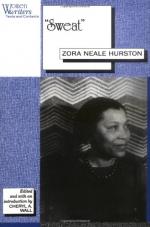|
This section contains 4,764 words (approx. 12 pages at 400 words per page) |

|
In the following essay, Seidel analyzes Hurston's narrative technique and the metaphor of the working woman as artist in "Sweat."
Zora Neal Hurston's short story "Sweat" (1926) presents a radical transformation of an oppressed black domestic worker who attempts to envision her work as a work of art. The story is remarkable in Hurston's body of work for its harsh, unrelenting indictment of the economic and personal degradation of marriage in a racist and sexist society.
To accomplish this, "Sweat" functions at one level as a documentary of the economic situation of Eatonville in the early decades of the twentieth century. Hurston uses a naturalistic narrator to comment on the roles of Delia and Sykes Jones as workers as well as marriage partners, but ultimately the story veers away from naturalistic fiction and becomes a modernist rumination on Delia as an artist figure. The story's coherence of theme...
|
This section contains 4,764 words (approx. 12 pages at 400 words per page) |

|




